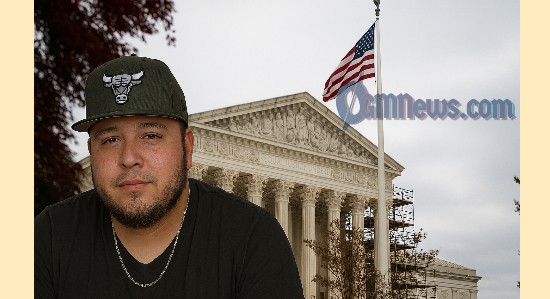In a landmark 9-0 decision on Thursday, the U.S. Supreme Court directed the Trump administration to facilitate the return of Kilmar Abrego Garcia, a Salvadoran national who was erroneously deported to El Salvador and detained in the country’s notorious “mega-jail.” The ruling upheld a lower court’s order mandating that federal officials “facilitate and effectuate” Garcia’s return, affirming that his removal had occurred due to an “administrative error.”
Garcia, now 29, had previously been granted protection from deportation by a U.S. immigration judge on the grounds that he faced persecution from gangs in his native El Salvador. Despite this ruling, federal agents removed him on March 15, placing him aboard a military aircraft under a U.S.-El Salvador agreement and transferring him to the Cecot prison, a facility infamous for housing hardened gang members.
The Supreme Court’s decision not only clears the path for Garcia’s return but also underscores the judiciary’s authority to intervene in immigration enforcement when errors occur. “The rule of law prevailed,” Garcia’s attorney, Simon Sandoval-Moshenberg, stated following the ruling. “The Supreme Court upheld the district judge’s order that the government has to bring Kilmar home.”
Trump Administration Appeals, Cites Executive Power in Foreign Policy
In the lead-up to the ruling, the Trump administration filed an emergency appeal, arguing that U.S. District Judge Paula Xinis lacked constitutional authority to direct the return of a deported individual. Solicitor General D. John Sauer contended that the district court’s order infringed upon the president’s exclusive power to conduct foreign diplomacy and manage national security, especially in matters involving suspected gang members.
“The Constitution charges the president, not federal district courts, with the conduct of foreign diplomacy and protecting the nation against foreign terrorists,” Sauer wrote in the court filing. While acknowledging the administrative error, the administration maintained that federal courts could not compel El Salvador to release or return Garcia.
Initially, the Supreme Court issued a temporary stay on Judge Xinis’s order pending review. However, in its final judgment, the justices declined to permanently block the directive, instead asking Judge Xinis to clarify the extent of her requirement that the administration “effectuate” Garcia’s return — a phrase that may imply overreach into foreign policy authority.
A Life Uprooted: Garcia’s Arrest, Detention, and Deportation
Garcia’s legal saga began in 2019 when he was arrested alongside three other men in Maryland and detained by U.S. Immigration and Customs Enforcement (ICE). Despite his undocumented status, Garcia was granted relief from removal after a judge found credible fears of persecution in his home country.
Garcia, who is married to a U.S. citizen, Jennifer Vasquez Sura, was abruptly deported in March 2025 in defiance of the court’s protection order. He was among several migrants flown to El Salvador as part of a security partnership between Washington and San Salvador targeting suspected gang activity. The U.S. government later acknowledged that Garcia was deported by mistake, although officials continue to allege—without presenting new evidence—that he has ties to the MS-13 gang, a claim his legal team vehemently denies.
Jennifer Sura, speaking to The New York Times, described the ordeal as an “emotional roller coaster” for their family. “This continues to be heartbreaking for our children and Kilmar’s family. But I will continue fighting until my husband is home.”
Legal and Diplomatic Questions Loom Following Ruling
Though the Supreme Court declined to impose a deadline for Garcia’s return, it directed the trial court to proceed with the case and clarify the scope of its original mandate. This move leaves room for further judicial debate over how much influence courts should exert in deportation matters involving international cooperation and diplomatic boundaries.
A Justice Department spokesperson expressed cautious approval of the court’s approach. “The Supreme Court correctly recognized that it is the exclusive prerogative of the President to conduct foreign affairs,” the spokesperson said, adding that the ruling reaffirms limits on judicial overreach into executive functions.
Nonetheless, immigration lawyers have hailed the decision as a crucial win for due process and the rights of individuals caught in bureaucratic failures. Legal experts note that while the court preserved some executive discretion, it also reaffirmed the judiciary’s power to remedy unlawful deportations—even when international relationships are at stake.
What Comes Next for Kilmar Garcia After Supreme Court Ruling?
With the case returning to the district court, attention now turns to how and when Garcia will be repatriated to the United States. The Supreme Court did not instruct a specific timeline for his return but upheld the foundational principle that errors in immigration enforcement must be corrected when lives and liberties are at stake.
Garcia’s lawyers have already begun coordinating with the U.S. State Department and Salvadoran authorities to secure his release from Cecot prison. According to Sandoval-Moshenberg, the focus is now on “undoing the harm that has been done” and ensuring Garcia’s legal rights are respected moving forward.
For Garcia and his family, the path to justice remains uncertain, but Thursday’s unanimous ruling signals a powerful step toward restitution. As Ms. Sura put it, “Kilmar doesn’t belong in a prison full of criminals. He belongs with his family, in our home.”














